#racial history
Explore tagged Tumblr posts
Text

"In Imperial Island, Charlotte Lydia Riley shows us that Empire’s legacy is soaked into Britain’s landscapes and built into its cities. From immigrant woes and racial tensions to the way in which imperial mindsets still color relations among black, white, and brown Britons, Empire is inescapably in the country’s national DNA. An eye-opening study of the Empire within."
#uwlibraries#history books#british history#imperial history#urban history#racial history#20th century
12 notes
·
View notes
Text
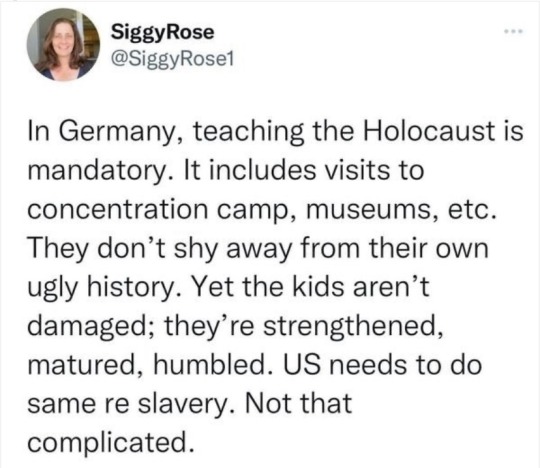
#woke is wonderful#this is why we can't have nice things#lies and the lying liars who tell them#teaching empathy#empathy#germany#german history#nazi germany#national history#awareness is power#awareness#history class#history#smash the patriarchy#empathy education#empowerment#history is repeating itself#history is awesome#black history#black lives matter#the invention of whiteness#white supremecy#racists#racisim#racial justice#racial history#civil rights#civil rights history
6 notes
·
View notes
Text
The Revolution Will Not Be Televised
#black panther party#black history#black unity#black first#b1#black people#black lives matter#blacklivesmatter#black excellence#black empowerment#black liberation#racial injustice#africa#black community
1K notes
·
View notes
Text
Non-offensive Historical terms for Black people in historical fiction
@pleasespellchimerical asked:
So writing historical fiction, with a white POV character. I'm not sure how to address race in the narration. I do have a Black main character, and I feel like it'd feel out of place to have the narrator refer to her as 'Black', that being a more modern term. Not sure how to do this without dipping into common historical terms that are considered racist today. Thoughts on how to handle this delicately, not pull readers out of the narrative? (fwiw, the POV character has a lot of respect for the Black character. The narration should show this)
There are non-offensive terms you can use, even in historical fiction. We can absolutely refer to Black people without slurs, and if slurs is all one can come up with, it’s time to go back to the drawing board. I cannot say which terms are best for your piece without knowing the time period, but hopefully the list below helps.
Historical terms to use for Black people (non-offensive)
African American documented as early as 1782 (documented in an ad in the Pennsylvania Journal). Note the identity isn’t accurate for non-American Black people.
African could refer to African people or “from 1722 as ‘of or pertaining to black Americans.’”
The place of origin could also be used. For example, “a Nigerian woman”
Africo-American documented as early as 1788.
People of Color documented as early as 1796 (with specific contexts, usually mixed people)
Afro American documented as early as 1817, 1831 (depending on source)
Black American documented as early as 1831
Black was used in Old English to refer to dark-skinned people. Black was not capitalized until recent years, so “She was a young black woman.” would make sense to say, though “She was a young Black woman.” is the better standard today, although not universally adopted. I personally prefer it capitalized.
Moor was used as early as the late 1400s for North African people, but had a somewhat flexible use where anyone visibly Black / Of African descent or the Afro Diaspora might be referred to or assumed as a Moor. Note, it has other meanings too, such as referring to Muslim people, but that doesn’t mean the person using it is going by the dictionary definition. Not really the way to go today, but okay in a historical setting (in my opinion).
Biracial (1860s), mixed race (1872), multiracial (1903) and multicultural (1940s) are also terms to refer to people of two or more races.
Occupation + description. Throughout history, many people have been referred to as their occupation. For example, the Carpenter, The Baker, the Blacksmith. Here’s an example of how you might go about using occupation and traits to identify a Black character in history. Here’s an example I came up with on the fly.
“You should go by Jerry’s. He’s the best blacksmith this town’s ever seen. Ya know, the real tall, dark-skinned, curly haired fellow. Family’s come here from Liberia.”
Offensive and less-sensitive terms for Black people
Blacks was used in plural more, but this is generally offensive today (Even writing it gives me **Thee ick*)
Colored was mostly used post-civil war until the mid 20th century, when it became unacceptable. This is not to be conflated with the South African Coloured ethnic group.
Negro/Negroes were also used as early as the 1550s. Capitalization became common in the early 20th century. I'm sure you know it is offensive today, though, admittedly, was not generally seen as such until around the 1960s, when Black replaced it. It does have its contexts, such as the trope “The Magical Negro” but going around using the term or calling someone that today is a lot different.
Mulatto referred to mixed people, generally Black and white, and is offensive today.
The N-word, in all its forms, is explicitly a slur, and there is absolutely no need to use it, especially in a casual manner, in your story. We’ve written about handling the N-word and alluding to it “if need be” but there are other ways to show racism and tension without dropping the word willy-nilly.
Deciding what to use, a modern perspective
I’m in favor of authors relying on the less offensive, more acceptable terms. Particularly, authors outside of the race. Seldom use the offensive terms except from actual direct quotes.
You do not have to use those offensive terms or could at least avoid using them in excess. I know quite famous stories do, but that doesn’t mean we have to so eagerly go that route today. Honestly, from teachers to school, and fellow non-Black students, it’s the modern day glee that people seem to get when they “get a chance to say it” that makes it worse and also makes me not want to give people the chance.
It goes back to historical accuracy only counting the most for an “authentic experience” when it means being able to use offensive terms or exclude BIPOC from stories. We’ve got to ask ourselves why we want to plaster certain words everywhere for the sake of accuracy when there are other just as accurate, acceptable words to use that hurt less people.
Disclaimer: Opinions may vary on these matters. But just because someone from the group cosigns something by stating they’re not offended by it, doesn’t mean a whole lot of others are okay with it and their perspectives are now invalid! Also, of course, how one handles the use of these words as a Black person has a different connotation and freedom on how they use them.
~Mod Colette
The colonial context
Since no country was mentioned, I’m going to add a bit about the vocabulary surrounding Black people during slavery, especially in the Caribbean. Although, Colette adds, if your Black characters are slaves, this begs the question why we always gotta be slaves.
At the time, there were words used to describe people based on the percentage of Black blood they had. Those are words you may find during your searches but I advise you not to use them. As you will realize if you dive a bit into this system, it looks like a classifying table. At the time, people were trying to lighten their descent and those words were used for some as a sort of rank. Louisiana being French for a time, those expressions were also seen there until the end of the 19th century.
The fractions I use were the number of Black ancestors someone had to have to be called accordingly.
Short-list here :
½ : mûlatre or mulatto
¼ or ⅛ : quarteron or métis (depending on the island, I’m thinking about Saint-Domingue, Martinique and Guadeloupe)
1/16 : mamelouk
¾ : griffe or capre
⅞ : sacatra
In Saint-Domingue, it could go down to 1/64, where people were considered sang-mêlé (mixed blood for literal translation, but “HP and the Half-Blood Prince” is translated “HP et le Prince de Sang-Mêlé” in French, so I guess this is another translation possibility).
-Lydie
Use the 3rd person narrative to your advantage
If you are intent on illustrating historical changes in terminology consider something as simple as showing the contrast between using “black” for first person character narration, but “Black” for 3rd person narrator omniscient.
-Marika
Add a disclaimer
I liked how this was addressed in the new American Girl books it’s set in Harlem in the 1920’s and there’s a paragraph at the beginning that says “this book uses the common language of the time period and it’s not appropriate to use now”
-SK
More reading:
NYT: Use of ‘African-American’ Dates to Nation’s Early Days
The Etymology dictionary - great resource for historical fiction
Wikipedia: Person of Color
2K notes
·
View notes
Text
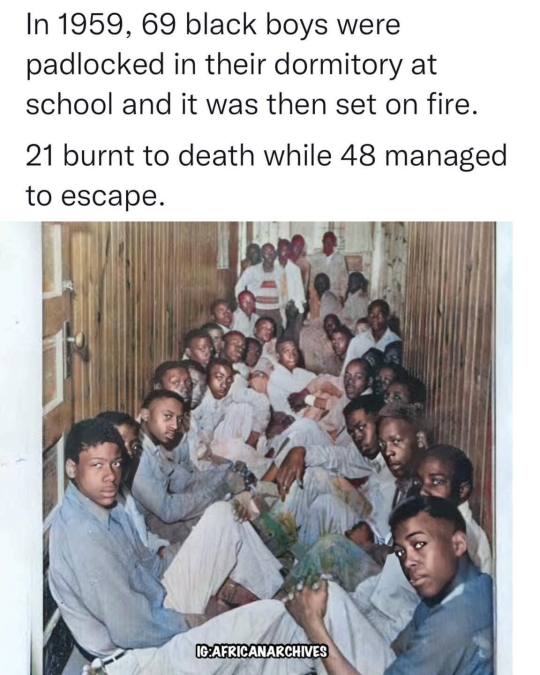
On March 5th, 1959, 69 African American boys, ages 13 to 17, were padlocked in their dormitory for the night at the Negro Boys Industrial School in Wrightsville. Around 4 a.m., a fire mysteriously ignited, forcing the boys to fight and claw their way out of the burning building. The old, run-down, & low-funded facility, just 15 minutes south of Little Rock, housed 69 teens from ages 13-17. Most were either homeless or incarcerated for petty crimes such as doing pranks. 48 boys managed to escape the fire. The doors were locked from the outside and fire mysteriously ignited on a cold, wet morning, following earlier thunderstorms in the same area of rural Pulaski County. The horrific event brought attention to the deplorable conditions in which the boys lived. The boys all slept in a space barely big enough for them to move around & theyre one foot apart from one another & their bathroom was a bucket at the corner where they had to defecate in. In an ironic twist, the land in which the school stood is now the Arkansas Department of Correction Facility Wrightsville Unit. In 2019 a plaque was finally placed after 60 years.
PURE EVIL!!! MY GOD!!
#white racial hatred#white people are evil#racism#civil rights#history#black history#historical injustice#institutional neglect#fire tragedy#juvenile justice#systemic racism#correctional facilities#commemoration#memorialization#social reform
1K notes
·
View notes
Text
a very common mistake people make in political/social discourse is applying individualist thinking to some social phenomenon or theory. one of the most common examples is someone responding to the theory of white privilege with “but there are poor white people” or male privilege with “I’m a man but I have no power” etc. and in order to refute that properly you have to essentially get into a philosophy of science debate, to explain that the benefit of a given social theory is its ability to be generalised above the level of the individual, that what is being described is a social process, that human beings occupy various positions within a social space (a family, a neighbourhood, a workplace, a state) that are not individual. To be able to give an account of some social force you necessarily cannot be just talking about the particularities of a single person - if you were, all you would be expressing is an individual opinion about a single person. If you want to rise above the level of ‘mere opinion’ you need to actually provide an account that is general enough to apply to multiple people of varying social situations but systematic enough to be able to differentiate between who you are and are not speaking about. Of course data are lost in this endeavour - probably best summed up by the aphorism “all models are wrong but some are useful” - but the success of a given social theory is its ability to sustain its explanatory power despite these data losses. Like the whole game of generalisation is building a theory to figure out what data points to discard and which to retain. It is no more contradictory to say white privilege is real even though there are poor white people than to say the police are a white supremacist institution even though there are non-white police officers. In fact these seeming contradictions are accounted for in these same social theories - white supremacy has had centuries of policy development at this point, it is a fairly well-tested set of logics that have adapted to a variety of conflicts, problems, and political/economic/social developments (Sylvia Wynter talks about this in the context of the post-slavery US for example). White supremacy is thus resilient to these apparent contradictions (and these contradictions generate further social developments, such as the shifting meanings and locations of whiteness), which is why zooming into the level of the individual is often not helpful in explaining its effects on a social level.
Weber says that I need not know Caesar to understand Caesar - that to talk about Caesar as a historical figure and as a particular location in ancient Roman society is fundamentally different than a description of him as an individual. And nobody actually talks about Caesar as an individual anyway! Even psychological or biographical profiles of him are premised on the fact that Caesar is worthy of this profile as opposed to any other person living in the Roman Republic. The reason we all know his name is that his place in history is extended beyond the individual. A Roman general and leader is fundamentally not an individual, not a private person. The very fact that I can say “Roman General” but not say any person’s name and have people understand what I’m saying is evidence of this. By definition ‘Caesar’ the historical figure is not an individual in any meaningful sense, he has power that is only available through social institutions and formations, and that is why he is known even today. Even the most liberal Great Man Theories of history locate an engine of history within the general position of Great Man (this is a fundamental contradiction within this type of thinking, the generalised Individual). If there can be more than one Great Man in history then he is not an individual, he is occupying a generalisable position in human history that can be calculated, bounded, and studied.
So it’s very frustrating to deal with! It’s an attempt to refute an explanation of a social phenomenon with individual anecdotes, much of which is already accounted for in said explanation. It makes many, many, many discussions about the social and political world endlessly repetitive and uninteresting, because you are always stuck at litigating the most basic, atomic point of reference. And of course that is the point for many people, they aren’t interested in any of this because they are racist and they are misogynistic and so on. It is an extremely effective derailing tactic, but part of the reason why it’s so effective is because individualism is such a pervasive mode of thinking. All of the groundwork is already laid out for people who say white privilege isn’t real because the social and epistemic infrastructure necessary to get other people to buy that argument has already been built for them to make that type of claim. Which is why the people who smirk at the camera when they say shit like this are so pathetic because they behave like they thought of that all by themselves, unaware or (more probably) deliberately ignoring the fact that they live in a society specifically built to facilitate, automate, and celebrate the garbage coming out of their mouth
#too lazy to cite directly but I’m engaging with Sylvia Wynter + Omi & Winant’s racial formation theory for the white supremacy history#And Bourdieu + Weber for the social/individual divide. Specifically Bourdieu’s theory of bureaucracy#I can scrounge up book/article titles for these if people want them I just don’t remember them off the dome#book club
259 notes
·
View notes
Text
remembrance day seems like a good day to remember that in 1937 churchill rejected the arab wish to stop zionist jewish migration to palestine by saying:
I do not admit that the dog in the manger has the final right to the manger, though he may have lain there for a very long time I do not admit that right. I do not admit for instance that a great wrong has been done to the Red Indians of America or the black people of Australia. I do not admit that a wrong has been to those people by the fact that a stronger race, a higher-grade race or at any rate a more worldly-wise race, to put it that way, has come in and taken their place. I do not admit it. I do not think the Red Indians had any right to say, 'American continent belongs to us and we are not going to have any of these European settlers coming in here'. They had not the right, nor had they the power.
#fuck that guy ammarite#winston churchill#palestine#israel#history#racism#racial slurs tw#admin dominique
2K notes
·
View notes
Text

Black Futures Matter
Digital illustration of a large diverse group of Black people of different ages, genders, sexualities, and ability. The color palette is orange and green. Text reads, 'Black futures matter.'
#black lives matter#racial justice#black history month#art#feminism#social justice#activist art#large group
946 notes
·
View notes
Text
colonization wasn't started by the europeans in the 1500s.
so stop trying to demonize Europe and America for what they have don't that MANY cultures around the world have already done.
and yes using the term "colonizer" is a racial slur and stop suing it.
#colonization#colonialsm#colonies#european history#englands#uk#america#france#dutch#enlglish#white people#colonizer#racial slurs#rome#greece#asia
402 notes
·
View notes
Text
Understanding Third-Sexing
Crossposted from my Troonsky account.



#transfeminism#gender is a regime#materialist feminism#lesbian feminism#sex is a social construct#social constructionism#feminism#transmisogyny#third sexing#degendering#orientalism#academic racism#queer theory#queer history#racialized disposability#racialized transmisogyny#transfeminine disposability
178 notes
·
View notes
Text

"Rachel Jean-Baptiste’s study of racially mixed people in colonial French Africa is not just the story of the making of a category but of the men and women who inhabited it, who tried to make their lives within a colonial racial order, and who acted collectively to challenge that order. Her deeply researched account brings out the ambiguous and contested meanings of race, colonialism, citizenship, and community."
17 notes
·
View notes
Text
IWTV Musings: Racism & Intersectionality, in Hollywood and in Fandom Spaces (Pt1: The Raceswaps)
This is in response/support of @adamnablelittledevil's post on this very subject:
"Hopefully people would finally understand nobody is making it up or exaggerating and it is indeed real and worse than they probably think."
Folk try to act like certain problems don't exist, especially when it concerns Black & Bipoc people in predominately white spaces with a KNOWN history of racism. People love to gaslight & be dismissive & rewrite history with revisionist narratives--especially to impressionable people & fans who are NEW to certain fandom spaces or racial dynamics/demographics, and DON'T know the history of the spaces they're entering, or the convos taking place--which is PRECISELY how we wound up with non-Black IWTV fans who ended up in the actual NEWS for prancing around an IRL plantation in 2024, acting like they never heard of slavery, ffs.
At some point, the venn diagram of accidental/willful ignorance, careless/irresponsible tone deafness, and active/passive-aggressive racism actually does intersect.

Incidents like this reflect a fandom steeped in problematic behavior that's too-long gone unchecked by the fans & network alike--who are also at fault for constantly mishandling its own project.

Contrary to poorly researched articles like USA today that denied/handwaved racist backlash against IWTV (a MUCH smaller & younger fandom compared to the LOTR & Amazon's Rings of Power adaptation), from its very inception, as early as the cast announcements, TVC's white fans were PISSED about the raceswaps & outright accused AMC of being woke/DEI (a la Bridgerton) when Jacob Anderson was cast as Louis DPDL.
A Quora thread from 2021:

A Reddit thread from July 2022: (Wayback Machine)

A Reddit thread from 2022 (circa Ep5): (Wayback Machine)

And boy oh boy did this one on Facebook in 2021 age poorly: 💀

Book fans constantly treat AMC's IWTV like performative colorblind trash, rather than as color-conscious prestige tv show that treats historical racism, colorism, classism, sexism, & homophobia seriously. They DGAF what showrunner Rolin Jones had to say about perpetuating the glorification of slaveowners, and just want a 1:1 adaptation of the books, when that was NEVER Rolin's intention.
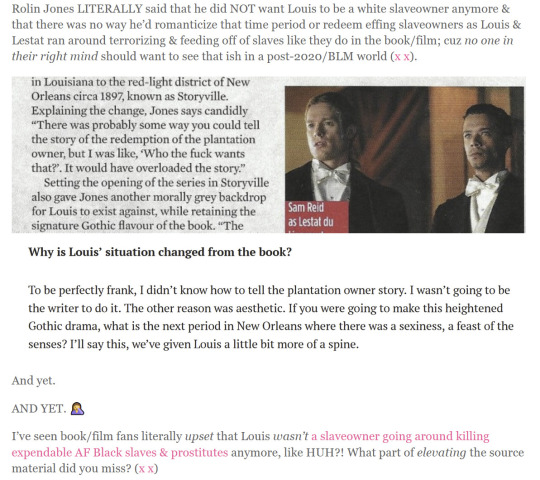
There's fans who to this day refuse to see/accept Delainey!Claudia, and apparently there's colorist trends on Twitter (cuz ofc 🙄😒) about seeing her as Armand's daughter instead of Lestat's, just cuz of her skin color, which WTF??? (x x x):

Book/film fans hypocritically complain constantly about Bailey Bass (18-19) AND Delainey Hayles (25) playing 14y/o Claudia; but then gush about Vampire Diaries & Twilight & other shows on MTV & CW--who have all casted full grown adults as teenagers. Critiques like this are interesting (x x):

Cuz they specifically mention the Romanian kids and how Claudia supposedly "cannot at all pass for a child." However:
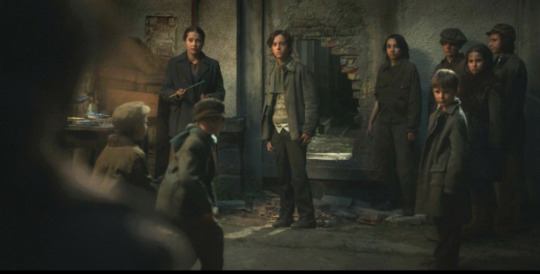

Some of those actual children ain't exactly tiny little toddlers & tykes either! 😅 Cuz age is a spectrum, not a monolith, imagine that.
And laaaawd don't get me started on Armand, and the BS that was happening on Reddit a few years ago (x x):


THIS is the kind of fandom we've been dealing with since DAY ONE.
And yet white fans have the nerve to whine about how tired and pissed they are whenever Bipoc fans call out the racism in the fandom/network, or god forbid look too-deep in the actual racially sensitive/relevant context of the show itself.
But I'll save my thoughts on all that for another post.
#interview with the vampire#amc immortal universe#racial inequality#racism#louis de pointe du lac#justice for claudia#read a dang history book#meritocracy of hypocrisy#america#amerikkka#louis de pointe du black
112 notes
·
View notes
Text
man the other thing that drives me crazy abt the whole "claiming judaism is an ethnicity and religion is race science just like the NAZIS" is that like....
what the nazis believed in was a mythical race of white europeans who were stronger and better than everyone else. they had 0 scientific, historic, or archeological proof of this. it was just a crackpot theory proposed to explain why white europeans were "better" than everyone else and provided an ideal for them to strive back to bc they thought that "pure" race had been tainted by racial "interbreeding"
jews saying judaism is an ethnicity is not bc it's in the fucking tanakh that they came from judea. it's bc there's MOUNTAINS of historical and archeological proof that jews came from that area. there's historical proof of people encountering jews in the middle east. there's firsthand accounts from jews themselves that survived diaspora that lived in that area. jewish DNA, regardless of other race, has a great deal of similarity w arabic DNA. there's MOUNTAINS of historical and archeological evidence that traces the movement of jews OUT of the area and into the rest of the world and the subsequent movement of jews for the next few thousand years as they kept getting kicked out or murdered
does any of that mean that israel should have displaced the people already living there and subjected them to decades of inequality and atrocity? fucking obviously not. but 1) denying historical and archeological fact to throw around your pet antisemitic conspiracy theory makes you sound like a qanon fuckass and 2) comparing that to white supremacists making up a mythical pure white race is just fucking insane and incredibly deeply antisemitic
like you don't have to make shit up to condemn what israel is doing, I promise you. you can acknowledge the nuance and hardship of history without condoning what israel does. israel doesn't need to be made up of pure europeans for you to criticize it. bc believe it or not, europeans are not the only people on earth capable of committing atrocities or having enough autonomy to do so.
#antisemitism#genuinely boils my blood lmao#like yes race is absolutely a social construct#that doesn't mean the very real history of judaism does not exist#also wild to compare it to racial purist ideas when outside of orthodox (as far as I'm aware)#most jews completely see converts as jewish in every way#& it's very easy to see where converts having children w ppl raised jewish gets a whole mix of dna#which is very much the antithesis of nazi racial purity
323 notes
·
View notes
Text
Hidden History
#ethiopia_war#history#blackhistoryfacts#african history#african american#black history#african america history#black lives matter#blacklivesmatter#ethiopia#africa#war#ethiopian#black people#black unity#black pride#black liberation#banned history#haile selassie#racial injustice#italy
550 notes
·
View notes
Text









Thomas and Douglas share a common legacy as historic coal mining and lumber towns, both of which reached their zeniths in the first half of the 20th century. The artifacts of area's industrial past, some of which are now being reclaimed by nature, are still evident along Douglas Road, which forks out of Thomas and follows the North Fork of the Blackwater River to Douglas. These include the beehive coke ovens that once lit up the night nonstop to produce coke for local blast furnaces. In addition to the abandoned structures, a number of coal company buildings have been preserved and added to the National Register of Historic Places, including the Davis Coal and Coke Company Administrative Building and the Buxton & Landstreet Company Store, which is now home to the Buxton & Landstreet Gallery and Studios. The area's bittersweet past includes a legacy of human exploitation and racial injustice. Like its brethren, the Davis Coal and Coke Company paid its miners in company scrip that was only redeemable at the company store, which charged inflated prices for goods and ensured it could reclaim their wages at a premium. The area was also home to the Coketown Colored School, a segregated school at the center of an important civil rights victory in 1892, when Carrie Williams, a teacher at the school, teamed with J. R. Clifford, the state’s first African-American lawyer, to defeat an effort by Tucker County to reduce the school’s term. The victory ensured equal pay and terms for African-American schools in West Virginia. The Coketown Colored School closed in 1954 when segregated schools were found unconstitutional.

#appalachia#vandalia#west virginia#allegheny mountains#fall#autumn#thomas#douglas#north fork of the blackwater river#douglas road#human history#abandoned places#preservation#buxton and landstreet company store#history#national register of historic places#coketon colored school#carrie williams#j.r. clifford#racial justice#industry#coal mining#beehive coke oven#new england aster#albert falls
58 notes
·
View notes
Text
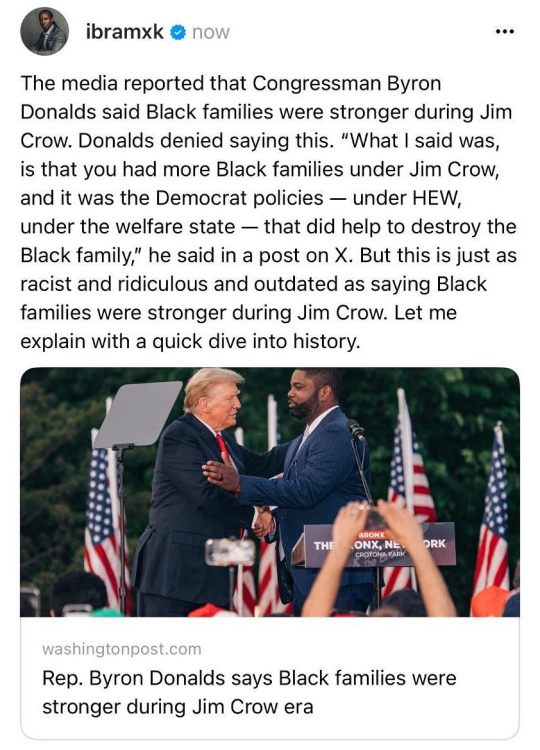
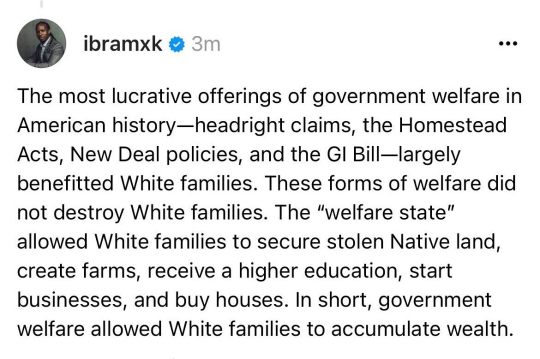
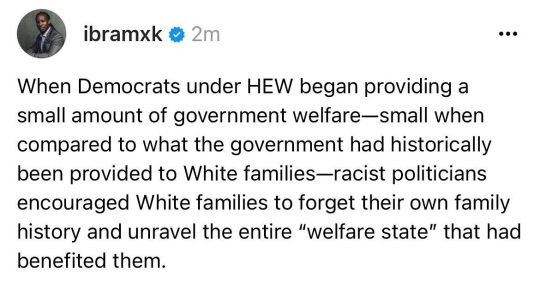
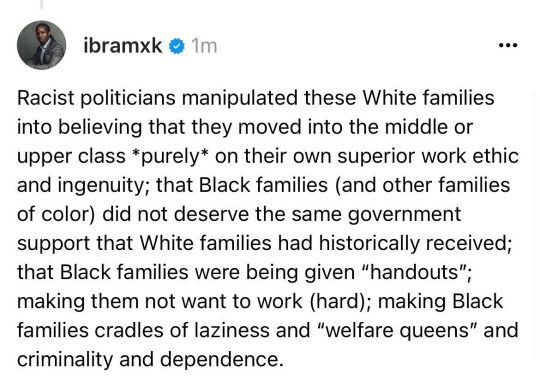
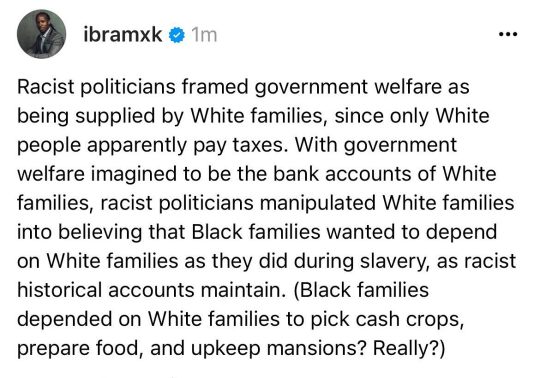
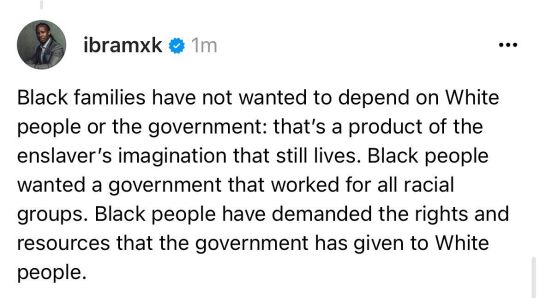
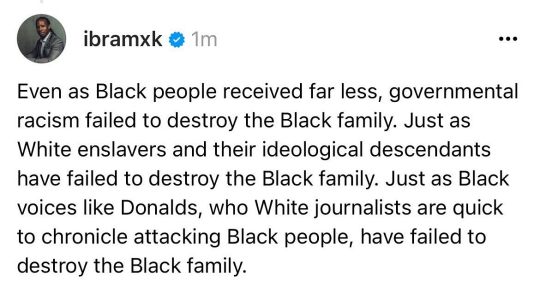
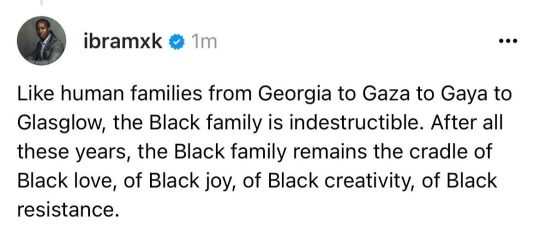

#jim crow#black family strength myth#black history#white supremacy#brian donalds#black republicans#welfare programs#government assistance#racial injustice#homestead act#new deal#gi bill#white privilege#wealth disparity#racial hatred#black family oppression#white supremacist narratives#systemic racism#black family resilience#jim crow laws#black family strength#black republican lies#government welfare#oppression of black people#historical racism#welfare myths#black history distortion#economic disparities#homestead act benefits#new deal exclusions
612 notes
·
View notes